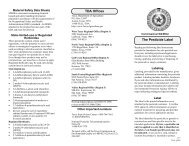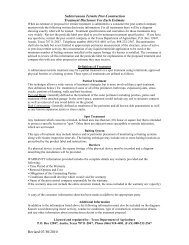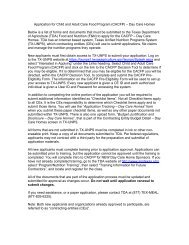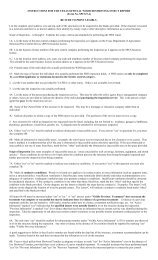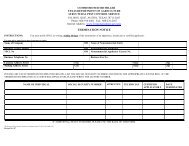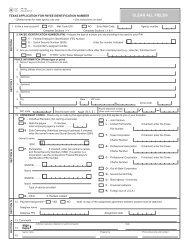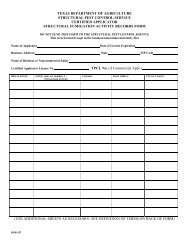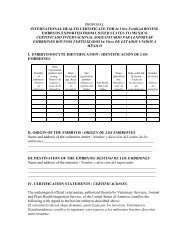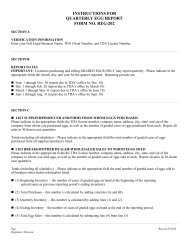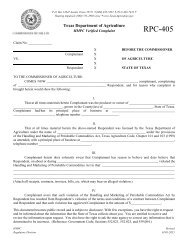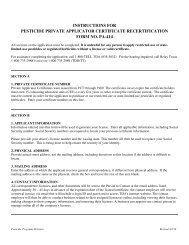Pink Hibiscus Mealy Bug, Maconellicoccus hirsutus - Texas ...
Pink Hibiscus Mealy Bug, Maconellicoccus hirsutus - Texas ...
Pink Hibiscus Mealy Bug, Maconellicoccus hirsutus - Texas ...
You also want an ePaper? Increase the reach of your titles
YUMPU automatically turns print PDFs into web optimized ePapers that Google loves.
<strong>Pink</strong> <strong>Hibiscus</strong> <strong>Mealy</strong>bug Pest Alert<br />
<strong>Pink</strong> <strong>Hibiscus</strong> <strong>Mealy</strong>bug, <strong>Maconellicoccus</strong> <strong>hirsutus</strong><br />
Lance Osborne, University of Florida<br />
The <strong>Pink</strong> <strong>Hibiscus</strong> <strong>Mealy</strong>bug was recently detected at separate homes in Harris and<br />
Brazoria counties. In cooperation with the U.S. Department of Agriculture, TDA<br />
collected 20 suspect mealybug samples from approximately two square miles<br />
surrounding the Pearland home. Of these 20 samples, six were confirmed as the pink<br />
hibiscus mealybug. TDA will initiate a similar survey around the southwest Houston<br />
home where the other mealy bug was detected to determine the extent of infestation.<br />
Inspectors have initiated control measures using biological control. They are releasing<br />
parasitic wasps at all locations where the pink hibiscus mealy bugs were found. Research<br />
has shown these parasitic insects are the best method to control mealybugs, resulting in<br />
approximately 90 percent success rate. The tiny wasps will only attack the mealybugs,<br />
not humans or pets. Upon release, the wasps lay eggs inside the mealybugs and as they<br />
grow, the mealybugs die. As wasps multiply, they spread in search of additional<br />
mealybugs. A successful mealy bug control requires several months.<br />
The pink hibiscus mealybug is a serious economic threat to agriculture, forestry, and the<br />
nursery industry. This pest attacks many plants, trees, and shrubs. For example, it infests<br />
hibiscus, citrus, coffee, sugar cane, annonas, plums, guava, mango, okra, sorrel, teak,<br />
mora, pigeon pea, peanut, grape, maize, asparagus, chrysanthemum, beans, cotton,<br />
soybean, and cocoa, just to name a few of its hosts. Host plants extend to 76 families and<br />
over 200 genera.
“Bunchy Top”<br />
Florida Department of Agriculture and Consumer Services<br />
As it feeds, using a piercing and sucking process, the pink hibiscus mealybug injects into<br />
the plant a toxic saliva that results in malformed leaf and shoot growth, stunting, and,<br />
occasionally, death. Leaves show a characteristic curling, similar to damage caused by<br />
viruses. Heavily infested plants have shortened internodes leading to a “bunchy top”<br />
appearance. A heavy, black, sooty mold may develop on an infested plant's leaves and<br />
stems as a result of the mealybug's heavy honey-dew secretions. When fruits are infested,<br />
they can be entirely covered with the white, waxy coating of the mealybug. Infestation<br />
can lead to fruit drop, or fruit may remain on the host in a dried and shriveled condition.<br />
If flower blossoms are attacked, the fruit sets poorly.<br />
Nurseries and garden stores should ensure that plants they offer for sale are free of pests,<br />
especially the pink hibiscus mealybug. If you have a mealybug infestation, use the<br />
information provided at the following web link to rule out common mealybug species. If<br />
you suspect the mealybug to be pink hibiscus mealybug, contact your <strong>Texas</strong> AgriLife<br />
Extension Service agent to determine if a sample is necessary for identification and<br />
confirmation.<br />
Additional information on the pink hibiscus mealybug can be found at the following<br />
weblinks:<br />
USDA/APHIS<br />
Florida Department of Agriculture and Consumer Services<br />
Press Releases:<br />
July 16, 2008<br />
September 17, 2007
To reach the <strong>Texas</strong> Department of Agriculture, please call:<br />
800 –TELL-TDA or 800-835-5832.



